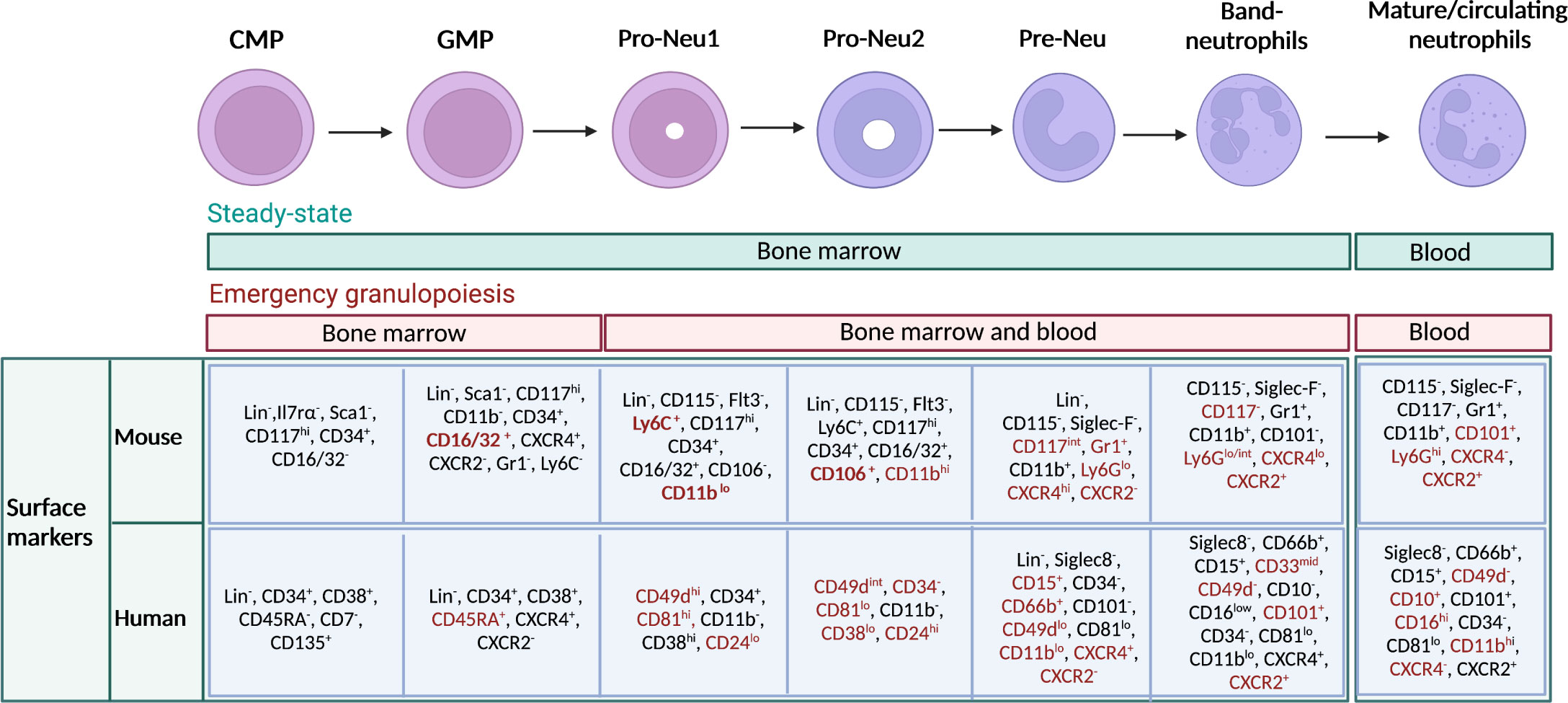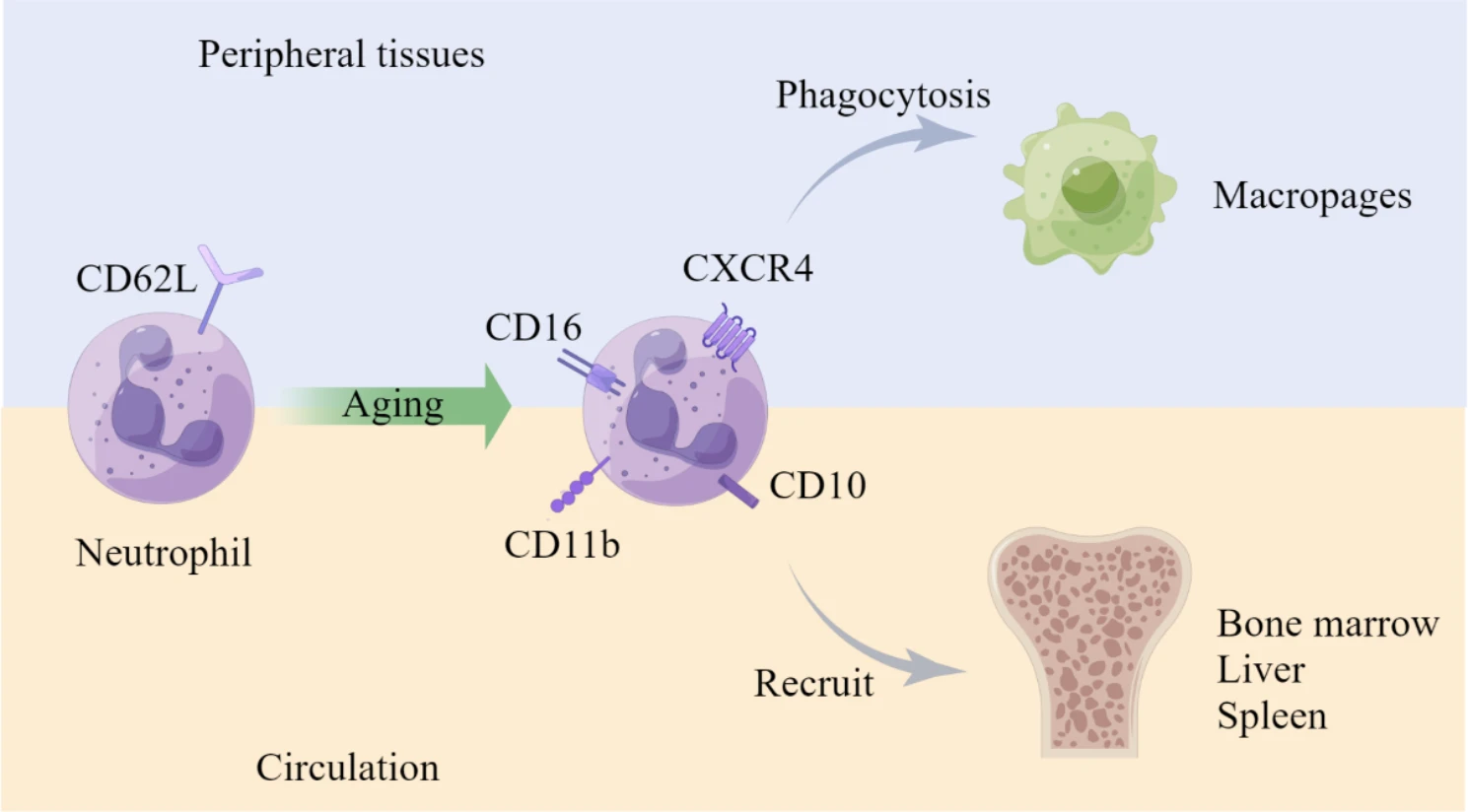CD Antigen (Neutrophils)
Related Symbol Search List
- CD147
- CD16a
- FCGR3B
- FCGR4
- TLR1
- TLR2
- CD200R
- CXCR1
- CXCR2
- ICAM-2
- LTBR
- CD89
- ITGA4
- CD300A
- CD68
- CEACAM3
- CSF1R
- CSF2RA
- Fas
- L1CAM
- CD10
- TNFRSF10D
- TRAILR4
Immunology Background
Available Resources for CD Antigen (Neutrophils) Research
Creative BioMart is committed to providing CD antigen (neutrophils)-related products, services and resources to researchers, clinicians and pharmaceutical companies around the world to help promote research and treatment in the fields of inflammation, autoimmunity, tumors and other diseases. We work closely with partners around the world to continuously add and update our product lines to meet customer needs and requirements.
We offer a wide variety of products such as recombinant proteins, protein-coupled magnetic beads, cell and tissue lysates, antibodies, and chromatography reagents, all related to neutrophil CD antigens. This broad selection ensures that researchers have access to the necessary tools for their specific research needs. |
We understand our customers' unique needs and provide customized services to produce specific antibodies, recombinant proteins, and other related products according to customer specifications. This gives researchers access to highly specific tools for experiments. |
We provide a wealth of resources related to neutrophil CD antigens to help researchers explore the latest discoveries in this field. These resources include protein functions, protein interactions, scientific literature, and other valuable information. |
About CD Antigen (Neutrophils)
Neutrophils, also known as polymorphonuclear leukocytes (PMNs), are a type of white blood cell that plays a crucial role in the immune response by helping to protect the body against infections. Neutrophils arise from hematopoietic stem cells (HSCs) in the bone marrow (BM), which give rise to multipotent progenitors, then common myeloid progenitors (CMPs), granulocyte–monocyte progenitors (GMPs), and subsequently to neutrophil-committed precursors. In the BM, GMPs mature into proNeus and then into preNeus, which differentiate into band neutrophils. Finally, non-proliferative mature neutrophils are released in the circulation (Fig.1). Neutrophils express a variety of cell surface antigens, including CD antigens, which are used to identify and characterize different subpopulations of neutrophils. CD antigens are cell surface molecules that can be detected by specific antibodies, and they are often used as markers to differentiate between different types of cells.
Some common CD antigens expressed on neutrophils include CD11b, CD16, CD18, and CD62L. CD11b and CD18 are integrins that are involved in the adhesion of neutrophils to the endothelium and in their migration to sites of infection. CD16 is a receptor for the Fc portion of IgG antibodies, which allows neutrophils to recognize and destroy antibody-coated pathogens. CD62L is a molecule that plays a role in the recruitment of neutrophils to sites of inflammation.
Overall, the expression of CD antigens on neutrophils helps to regulate their activity and function in the immune response, making them essential components of the body's defenses against infection.
 Fig.1 Maturation stages of neutrophils and immunophenotype in mouse and human. (Carnevale S, et al., 2023)
Fig.1 Maturation stages of neutrophils and immunophenotype in mouse and human. (Carnevale S, et al., 2023)
Function and Significance of Neutrophils CD Antigens
Neutrophil CD antigens play important roles in the function and signaling of neutrophils, contributing to their immune responses and interactions with other cells and molecules. Here are some of the functions and significance of neutrophil CD antigens:
Adhesion and Migration
CD antigens, such as CD11b/CD18 (Mac-1) and CD62L (L-selectin), are involved in neutrophil adhesion to endothelial cells and subsequent migration to sites of inflammation. These adhesion molecules facilitate the rolling, tethering, and firm adhesion of neutrophils to the endothelium, allowing them to leave the bloodstream and enter tissues.
Phagocytosis and Killing
CD antigens like CD16 (FcγRIII) and CD64 (FcγRI) are Fc receptors that mediate the recognition and phagocytosis of opsonized pathogens by neutrophils. They bind to the Fc portion of antibodies and facilitate the engulfment of antibody-coated microbes. CD16 and CD64 also participate in antibody-dependent cellular cytotoxicity (ADCC) and the release of antimicrobial substances.
Activation and Signaling
Several CD antigens on neutrophils, such as CD11b, CD66b, and CD177, are involved in cellular activation and signaling. They can trigger intracellular signaling pathways upon engagement, leading to the release of inflammatory mediators, respiratory burst (production of reactive oxygen species), and degranulation of antimicrobial enzymes and proteins.
Cell-to-Cell Interactions
Neutrophil CD antigens facilitate interactions with other immune cells and molecules in the inflammatory microenvironment. For example, CD11b/CD18 (Mac-1) can bind to ICAM-1 (intercellular adhesion molecule-1) and contribute to cell-to-cell interactions and immune synapse formation with other leukocytes. These interactions play a crucial role in coordinating immune responses and regulating inflammation.
Disease Associations
Alterations in the expression or function of neutrophil CD antigens have been implicated in various diseases. For example, increased CD11b expression and activation are associated with neutrophil-mediated tissue damage in inflammatory conditions like rheumatoid arthritis. CD66b and CD177 have been linked to neutrophil activation and migration in certain inflammatory disorders.
Understanding the functions and significance of neutrophil CD antigens provides insights into the mechanisms of neutrophil-mediated immune responses, inflammation, and disease pathogenesis. These antigens serve as valuable markers for studying neutrophil subsets, activation states, and interactions within the immune system, aiding in the development of targeted therapies and diagnostic approaches for immune-related disorders.
 Fig.2 CD antigens in neutrophil clearance. In cancer, the clearance of neutrophils is also mediated by key signaling molecules. This process exhibits distinct characteristics in both the tissue and circulation. Aged neutrophils, which have a shorter lifespan, express increasingly high levels of CD16, CXCR4, CD10, and CD11b. They can either be recruited back into the bone marrow through a CXCR4/CXCL12-dependent pathway or be eliminated by macrophages in peripheral tissues. (Liu S, et al., 2023)
Fig.2 CD antigens in neutrophil clearance. In cancer, the clearance of neutrophils is also mediated by key signaling molecules. This process exhibits distinct characteristics in both the tissue and circulation. Aged neutrophils, which have a shorter lifespan, express increasingly high levels of CD16, CXCR4, CD10, and CD11b. They can either be recruited back into the bone marrow through a CXCR4/CXCL12-dependent pathway or be eliminated by macrophages in peripheral tissues. (Liu S, et al., 2023)
Discovery of Neutrophil CD Antigen in Clinical Studies
Neutrophil CD antigens have significant relevance in disease diagnosis, prognosis, and the development of potential therapeutic strategies. Here's a discussion of their importance in each of these areas:
Disease Diagnosis
- Neutrophil CD antigens can serve as diagnostic markers for specific diseases. For example, increased expression of CD11b and CD66b has been associated with inflammatory conditions like rheumatoid arthritis and inflammatory bowel disease. Monitoring the levels or activation status of these antigens can aid in disease diagnosis and monitoring disease progression.
- The presence of specific neutrophil CD antigens, such as CD64, has been explored as a diagnostic marker for infections. Elevated CD64 expression on neutrophils may indicate bacterial or fungal infections, and its measurement can assist in the differentiation of infectious and non-infectious conditions.
Disease Prognosis
- The expression patterns of neutrophil CD antigens can provide prognostic information in certain diseases. For instance, altered expression of CD177 on neutrophils has been associated with adverse outcomes in conditions like anti-neutrophil cytoplasmic antibody (ANCA)-associated vasculitis.
- Studies have demonstrated that the expression levels of CD11b and CD62L on neutrophils can be indicative of disease severity and prognosis in various inflammatory disorders. These antigens can help stratify patients and guide treatment decisions.
Therapeutic Targeting
- Neutrophil CD antigens present potential targets for therapeutic intervention. Modulating the function or expression of these antigens can impact neutrophil-mediated immune responses and inflammation.
- Antibodies or small molecules targeting specific neutrophil CD antigens, such as CD11b or CD16, have been investigated as potential therapeutics for inflammatory diseases. By blocking these antigens, it is possible to attenuate neutrophil recruitment, activation, or phagocytosis, thereby reducing tissue damage and inflammation.
- Targeting neutrophil CD antigens involved in cell-to-cell interactions, such as CD11b/CD18 (Mac-1), can disrupt immune synapse formation and inhibit excessive inflammatory responses.
It is worth noting that therapeutic targeting of neutrophil CD antigens should be approached with caution, as neutrophils play essential roles in host defense against infections. Balancing the therapeutic benefits with potential risks, such as impaired immune responses, is crucial.
In summary, neutrophil CD antigens have clinical relevance in disease diagnosis and prognosis. Moreover, they hold promise as therapeutic targets to modulate neutrophil functions and mitigate inflammatory diseases. Continued research in this field may lead to the development of novel diagnostic tools and targeted therapies aimed at improving patient outcomes.
Contact us today to learn more about our neutrophil CD antigens products and how we can assist you in your research endeavors. Together, we can make a difference in the field of immunology and beyond.
Related References
- Lakschevitz FS, Hassanpour S, Rubin A, Fine N, Sun C, Glogauer M. Identification of neutrophil surface marker changes in health and inflammation using high-throughput screening flow cytometry. Exp Cell Res. 2016;342(2):200-209.
- Carnevale S, Di Ceglie I, Grieco G, Rigatelli A, Bonavita E, Jaillon S. Neutrophil diversity in inflammation and cancer. Front Immunol. 2023;14:1180810.
- Liu S, Wu W, Du Y, et al. The evolution and heterogeneity of neutrophils in cancers: origins, subsets, functions, orchestrations and clinical applications. Mol Cancer. 2023;22(1):148.
- Sandilands GP, Ahmed Z, Perry N, Davison M, Lupton A, Young B. Cross-linking of neutrophil CD11b results in rapid cell surface expression of molecules required for antigen presentation and T-cell activation. Immunology. 2005;114(3):354-368.

